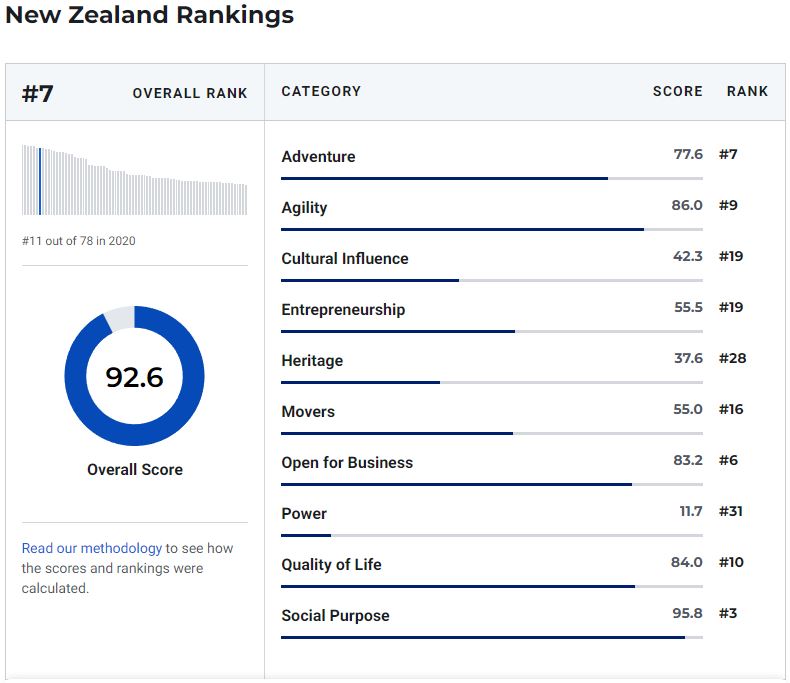Best Countries for Quality of Life (sources US News)
Beyond the essential ideas of broad access to food and housing, to quality education and health care, to employment that will sustain us, quality of life may also include intangibles such as job security, political stability, individual freedom and environmental quality.
What social scientists do agree on is that material wealth is not the most important factor in assessing a life lived well. The results of the Quality of Life sub-ranking survey reflect that sensibility.
The 2021 Best Countries rankings, formed in partnership with BAV Group and the Wharton School of the University of Pennsylvania, are based on a study that surveyed more than 17,000 global citizens from four regions to assess perceptions of 78 countries on 76 different metrics. The Quality of Life subranking is based on an equally weighted average of scores from nine country attributes that relate to quality of life in a country: affordable, a good job market, economically stable, family friendly, income equality, politically stable, safe, well-developed public education system and well-developed public health system. The Quality of Life subranking score had a 13.88% weight in the overall Best Countries ranking.
People consistently view a small group of nations as being best at providing for their citizens. For the sixth consecutive year, Canada ranks No. 1 overall for providing a good quality of life. Survey respondents rank the North American country as No. 1 for having a good job market, No. 2 for being politically stable and No. 3 for having a well-developed public education system, a perception supported by independent research. The North American country is seen as possessing the fourth-best developed public health care system. In fact, Canada is rated in the top 10 in all but one of the nine attributes, affordability, where Asian countries dominate.
Seven European countries are ranked in the top 10: Denmark, Sweden and Norway immediately follow Canada, with Switzerland, the Netherlands, Finland and Germany; Australia and New Zealand also finished in the top 10 countries in Quality of Life.
Countries perceived to provide a lower quality of life perform most poorly in areas concerning personal safety and economic opportunity. Iraq, Lebanon and Uzbekistan are at the bottom of the quality of life ranking, followed by El Salvador, Serbia and Azerbaijan. The Dominican Republic – which ranks 53rd for quality of life – finishes last for its public education system, while Colombia (60th for quality of life) places last for safety.
Quality of Life Rankings

OVERVIEW OF CANADA (sources US News)
Canada takes up about two-fifths of the North American continent, making it the second-largest country in the world after Russia. The country is sparsely populated, with most of its residents living within 125 miles of its border with the United States. Canada’s expansive wilderness to the north plays a large role in Canadian identity, as does the country’s reputation of welcoming immigrants.
Although the Norse briefly settled in Canada during the 10th century, European exploration accelerated in the 1500s. France and Britain angled for control over the region, with the British cementing their dominance in the year 1763. The country was a collection of British colonies until it became a self-governing dominion in 1867.
Canadians pride themselves in encouraging all of their citizens to honor their own cultures. In 1971, Canada adopted a national policy of multiculturalism, which celebrates the country’s diversity. At the same time, Canada faces national challenges related to the concerns of indigenous people and those in the predominantly French-speaking province of Quebec. While constitutional guarantees allow the province wide-ranging cultural and linguistic autonomy, movements for complete independence come in waves.
The list of accomplished and eclectic Canadian writers and artists is long. Joni Mitchell, Avril Lavigne and Drake are just a few of the Canadians who have made an impression on modern music.
Technically, Canada is a constitutional monarchy with the U.K. monarch as the head of state. The royal leader is represented locally by a largely ceremonial governor-general appointed by the Canadian prime minister. The government follows the British style of parliamentary democracy. The capital, Ottawa, is located in the province of Ontario.
Canada is a high-tech industrial society with a high standard of living. Trade agreements in the 1980s and 1990s dramatically bolstered trade with the U.S., and now the two counties are each other's largest trading partner. While the service sector is Canada’s biggest economic driver, the country is a significant exporter of energy, food and minerals. Canada ranks third in the world in proven oil reserves and is the world’s fourth-largest oil producer.
Canada is a member of the United Nations, through which it has participated in many peacekeeping missions. It is also a member of NATO and the Commonwealth of Nations.
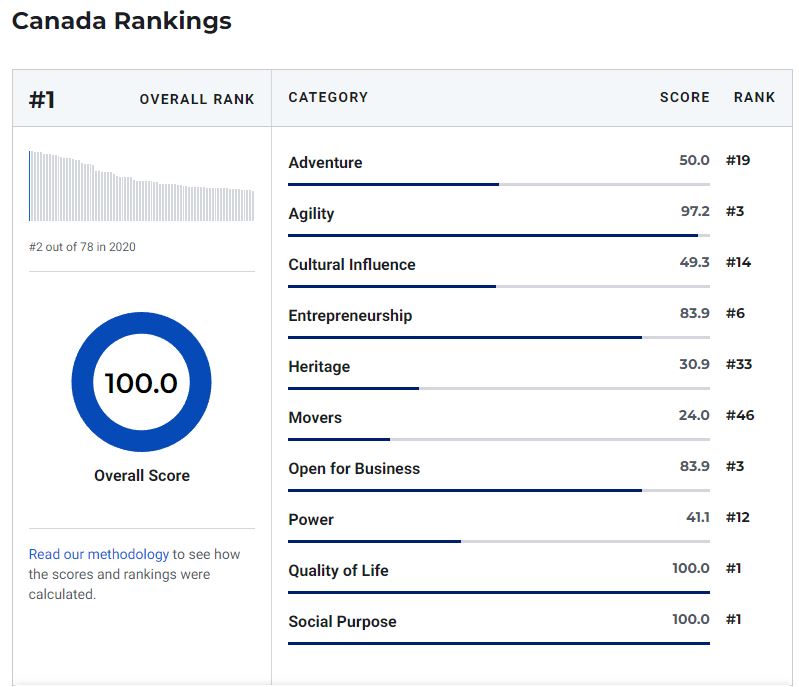

OVERVIEW OF DENMARK (sources US News)
The Kingdom of Denmark emerged in the 10th century and includes two North Atlantic island nations, the Faroe Islands and Greenland. Along with Sweden and Norway, it forms Scandinavia, a cultural region in Northern Europe.
Copenhagen, Denmark’s capital, is home to notable institutions such as the Copenhagen Stock Exchange. The capital also serves as a hub connecting Northern Europe with the rest of the world, with the largest international airport in Scandinavia, an active port, a subway system and the Oresund Bridge, connecting the city to Malmo, Sweden.
Since 1849, Denmark has operated under a constitutional monarchy. Queen Margrethe II is the current ceremonial head of state and Lars Lokke Rasmussen is prime minister. The Folketing is Denmark’s supreme legislative body; its members are elected by the Danish people. The Danish government is perceived as highly stable and very transparent.
Through progressive taxation, Denmark employs a universal health care system in which citizens receive mostly free medical care. Higher education is also free. Unsurprisingly, Denmark’s highly progressive government and societal structure creates incredible social mobility.
Denmark has several leading industries including food processing, tourism and the production of iron, steel and machinery. Its main exports are processed foods, agricultural and industrial machinery, pharmaceuticals and furniture.
Denmark’s economy is based on the flexicurity model, which combines a flexible labor market with a policy for the unemployed. This flexicurity model allows for businesses to establish inexpensively and quickly, as there is scarce government oversight regarding matters such as terminations or work hours. The Danish corporate tax rate is 24.5 percent, but its income tax rate is among the highest in the world.
A founding member of NATO, Denmark is a member of many other international organizations including the European Union, United Nations, the Nordic Council, the Organization for Economic Cooperation and Development and the Organization for Security and Cooperation in Europe.
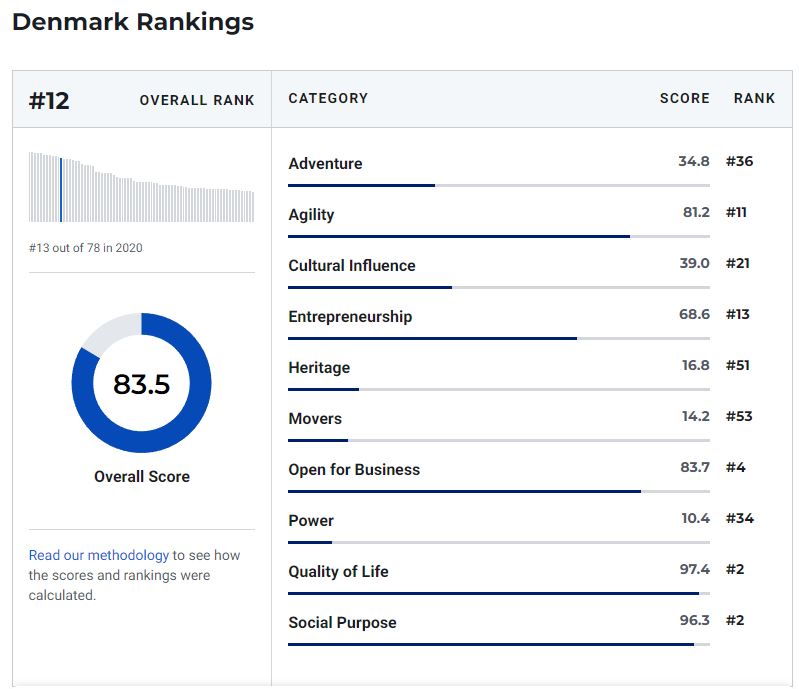

OVERVIEW OF SWEDEN (sources US News)
The Kingdom of Sweden, flanked by Norway to the west and the Baltic Sea to the east, expands across much of the Scandinavian Peninsula and is one of the largest countries in the European Union by land mass. Capital city Stockholm was claimed in the 16th century, and border disputes through the Middle Ages established the modern-day nation.
Despite its militaristic roots, Sweden has remained neutral in times of war for centuries. Instead, commitment to human rights, public service and sustainability have helped to make it a respected leader in international affairs.
Sweden operates under a model similar to those of other Nordic nations: heavily capitalistic with a large percent of spending going toward public service. Once well above the global average, tax rates have decreased, and an advanced infrastructure and transportation network assist with equal wealth distribution. Health care, as well as a college education, are free, and its people boast one of the longest life expectancies in the world. Almost all of Sweden's trash is recycled.
Swedes are some of the world’s most generous people, donating about 1 percent of gross national product to humanitarian aid programs each year. The society continues to diversify as a growing number of refugees, currently accounting for 10 percent of the population, are welcomed into Swedish borders.
As a parliamentary democracy, representatives elected to parliament, called the Riksdag, lead the nation with a monarch as a ceremonious head of state. Sweden joined the European Union in 1995, but declined to convert to the eurozone currency after a public vote in 2003.
However, Sweden's export-dependent economy is tightly integrated with the European Union. Both took a tumble with the recent decline of the euro, but Sweden is seeing steady recovery and seeking to expand trade markets for its timber, hydropower and iron ore.
Sweden is an Enhanced Opportunities Partner of the North Atlantic Treaty Organization. It is also a member of the United Nations, the Organization for Economic Cooperation and Development and the World Trade Organization, among others.
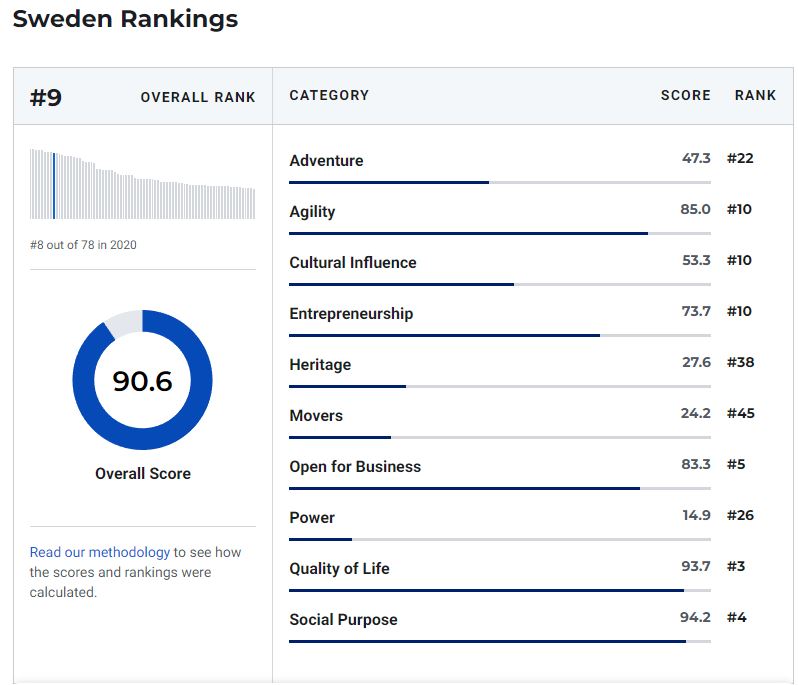

OVERVIEW OF NORWAY (sources US News)
The Kingdom of Norway is the westernmost country in the Scandinavian peninsula, made up mostly of mountainous terrain. Nearly all of its population lives in the south, surrounding the capital, Oslo. Norway’s coastline is made up of thousands of miles of fjords, bays and island shores.
The Norwegians developed a maritime culture, and were active throughout the Viking era, establishing settlements in Iceland and Greenland. For many years, Norway’s fate was tied to Denmark and Sweden. In 1905, Norway gained independence from Sweden through a referendum. The country was neutral during both World Wars but was nonetheless occupied by Nazi Germany for five years.
Norway is a high income nation with a vibrant private sector and a substantial safety net. Discovery of oil and gas off the coast in the 1960s gave the country an economic boost and today Norway is one of the world's leading petroleum exporters.
Norway’s roughly 5 million people live in a constitutional monarchy. The prime minister, the head of government, is nominally chosen by the monarch with the approval of the legislature. About 80 percent of people are Evangelical Lutheran, according to the CIA World Factbook. Higher education is mostly free.
Long an isolated country on the outskirts of Europe, Norway has maintained many of its storytelling and folklore customs. The country developed a rich literary tradition after splitting from Denmark in the 19th century, and is now among the world leaders in books published per capita. About 40,000 Sami people maintain a distinct culture in the north of the country, where they heard reindeer. Skiing and skating are national pastimes.
Like many countries in Europe, Norway struggles with how to integrate refugees and ethnic minorities. Other challenges include how to preserve the country's robust social safety net with an aging population, and how to continue to be economically competitive as global oil prices fall.
In 1949, Norway abandoned neutrality and became a member of NATO. The country is not a member of the European Union, rejecting membership In both 1972 and 1994.
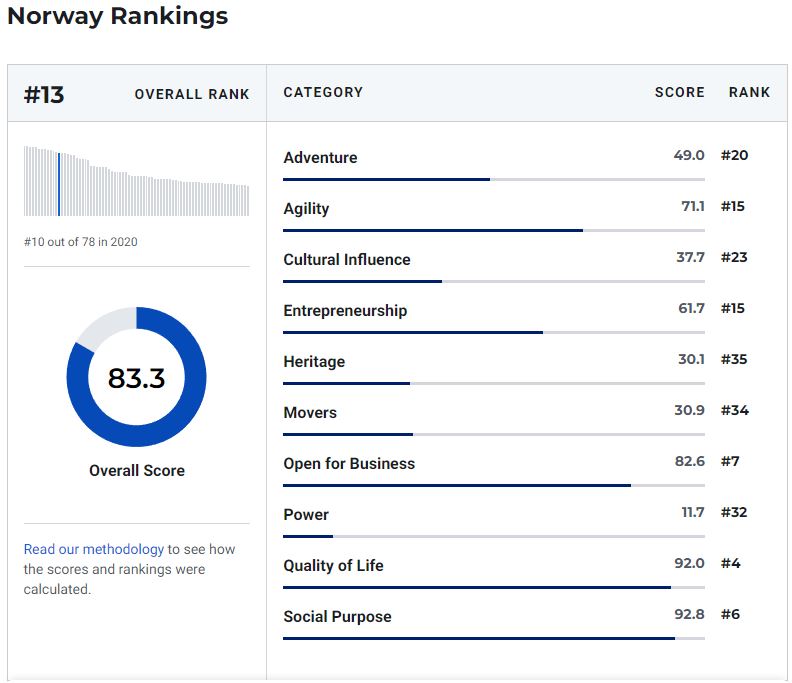

OVERVIEW OF SWITZERLAND (sources US News)
Switzerland, officially called the Swiss Confederation, is a small country in Central Europe made up of 16,000 square miles of glacier-carved Alps, lakes and valleys. It’s one of the world’s wealthiest countries, and has been well-known for centuries for its neutrality.
The Swiss Confederation was initially founded in 1291 as a defensive alliance among cantons. In 1499, the Confederation became independent from the Holy Roman Empire. In 1848, a new constitution turned the Confederation into a centralized federal government, ending a period of conflict. Since then, the country has enjoyed relative tranquility.
Switzerland has low unemployment, a skilled labor force and one of the highest gross domestic products per capita in the world, according to the CIA World Factbook. The country’s strong economy is powered by low corporate tax rates, a highly-developed service sector led by financial services and a high-tech manufacturing industry.
Switzerland is a federal republic made up of 26 cantons and an administrative capital in Bern. Most of its citizens live in towns and cities, the largest of which is Zurich – the most cosmopolitan of the country’s cities. The country prides itself on its diversity, and is home to regions with distinct cultural identities. German, French, Italian and Romansh language all enjoy national status.
The country’s cultural contributions are disproportionate to its small size. Swiss citizens have won more Nobel Prizes and registered more patents per capita than most other nations. And its neutrality during periods of conflict attracted some of the world’s greatest minds to immigrate, including James Joyce, George Byron and Voltaire.
Switzerland is also notable for its secretive banking sector. Reporting rules and legislation have led to more transparency, but secrecy rules persist and nonresidents are allowed to conduct business through offshore entities and various intermediaries.
Switzerland’s neutrality has long been honored by its European neighbors – the country didn’t take a side in either of the world wars and is not a member of the European Union. As a result, Switzerland, particularly Geneva, is a popular headquarter location for international organizations, such as the International Committee of the Red Cross and the United Nations, though Switzerland did not join the latter until 2002. The country is also a member of the IMF, WTO and World Bank.
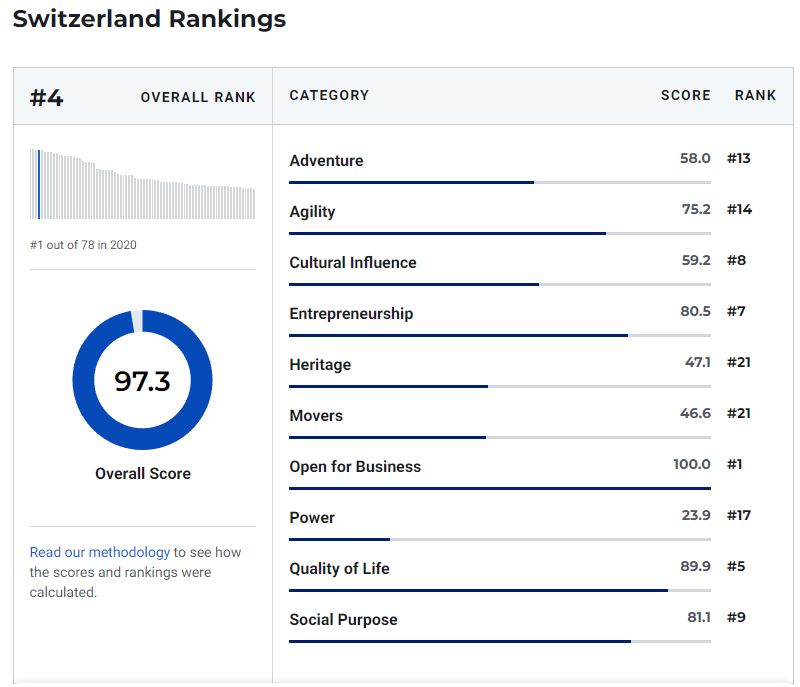

OVERVIEW OF AUSTRALIA (sources US News)
The Commonwealth of Australia occupies the Australian continent. The country also includes some islands, most notably Tasmania. Indigenous people occupied the land for at least 40,000 years before the first British settlements of the 18th century.
Australia has a parliamentary democracy government similar to the United Kingdom. While it separates its federal government into “three arms” – parliament, executive and judiciary – the executive answers to the parliament. In 1986 the nation ended all constitutional ties to the United Kingdom, although Queen Elizabeth II remains the ceremonial head of state.
Since the late 18th century, Australia has been influenced by British, Celtic and U.S. culture. In recent decades, however, immigration from non-English-speaking nations – primarily from Asia – has altered the nation’s demographic profile and influenced its popular culture.
Australia is considered a wealthy nation with a market-based economy that has a comparatively high gross domestic product and per capita income. Its economy is driven by the service sector and the export of commodities.
The nation has a high rate of participation in sporting activities and boasts a comparatively high life expectancy for both females and males. Its major cities routinely score well in global livability surveys. Late in 2017, voters overwhelmingly supported legalizing same-sex marriage, sending the issue to federal lawmakers.
Australians remain particularly concerned about environmental issues, according to survey and government data. The country has ratified the Kyoto Protocol, the United Nations treaty that calls on nations to reduce greenhouse gas emissions. Nevertheless, carbon dioxide emissions per capita are comparatively high among nations.
Australia is a member of major international and regional organizations, including the United Nations, the Group of 20, the World Trade Organization, the Organization for Economic Cooperation and Development, the Commonwealth of Nations and Asia-Pacific Economic Cooperation.
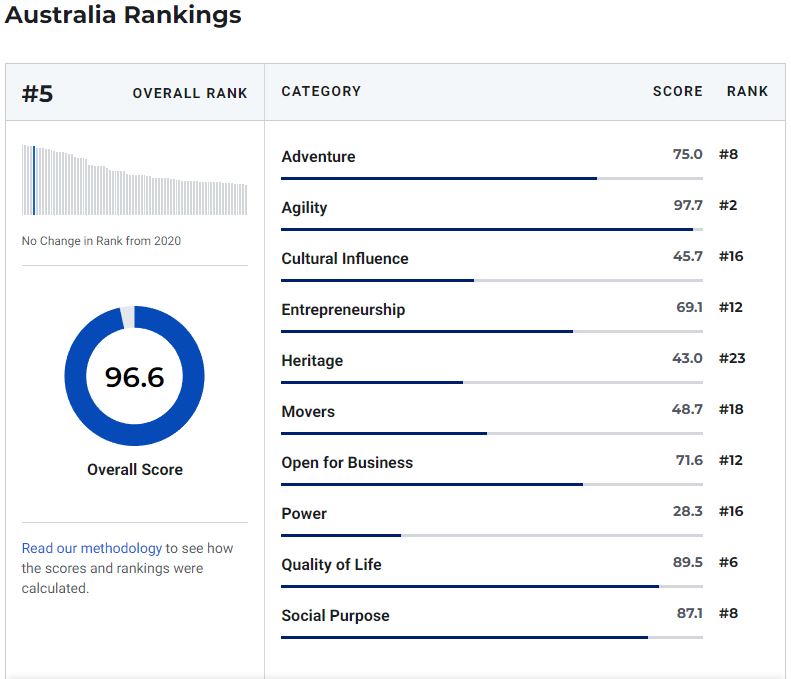

OVERVIEW OF NETHERLANDS (sources US News)
Situated along the fringes of Western Europe, the Netherlands is a coastal lowland freckled with windmills characteristic of its development around the water. Three major European rivers – the Rhine, Meuse and Schelde – run through neighbors Germany and Belgium into the nation’s busy ports.
The Kingdom of the Netherlands emerged in 1815 after years of Spanish and later French occupation. In 2010, a collection of island territories in the Caribbean known as the Dutch Antilles were disbanded, but Aruba, Curacao and Sint Maarten remain constituent countries within the Kingdom.
Known as Dutch, the people of the Netherlands have formed what has long been considered a tolerant society, though some politicians are increasingly voicing concerns over immigration. In 2001, the country became the first to legalize same-sex marriage, and national stances on drugs, prostitution, euthanasia and abortion are liberal. The country also boasts the highest concentration of museums in the world. It was the birthplace of Rembrandt and Van Gogh, as well as the microscope, telescope and thermometer.
More than 1,000 bridges and 20,000 miles of bike paths connect the densely populated nation, with most citizens concentrated in a grouping of cities along the coast, known as the Randstad. Much of the country is underwater, and the 60 million people that touch down in capital city Amsterdam’s Schiphol Airport each year land more than a dozen feet below sea level.
The seat of the government is located about 40 miles southwest of The Hague. The Dutch operate under a constitutional monarchy with an elected parliament.
Known for its tulips, this high-income, developed nation is one of the world’s leading exporters of agriculture, an industry that has become mostly mechanized. An open-market policy and prime transportation location help the Netherlands maintain a trade surplus, but the economy continues to recover from an expensive stimulus program designed to help it bounce back after the economic downturn in 2009.
The Netherlands is active in United Nations peacekeeping efforts and headquarters The International Court of Justice and the International Criminal Court in The Hague. It was a founding member of NATO and the modern-day European Union, of which it has been quite vocally supportive.
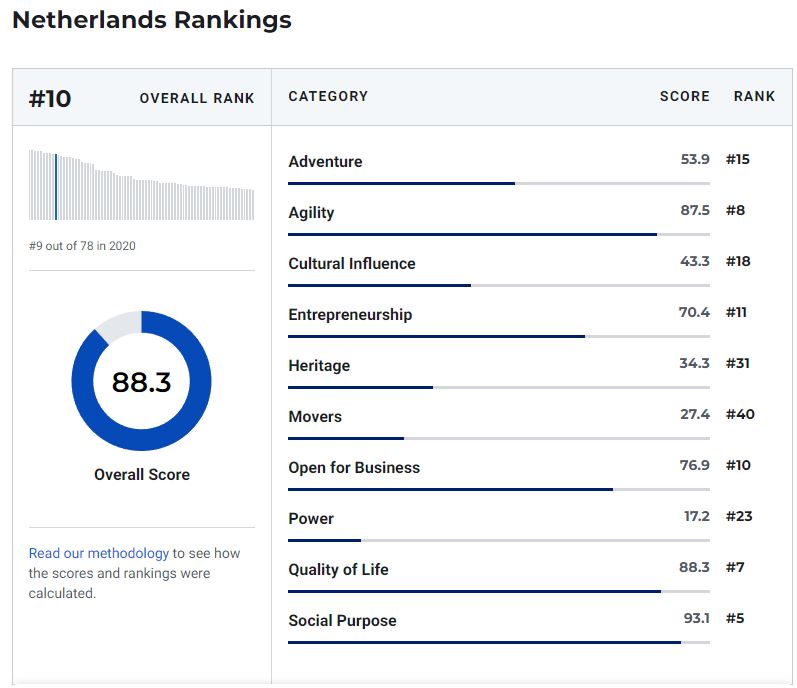

OVERVIEW OF FINLAND (sources US News)
Geography defines the history and culture of Nordic Finland, one of the most northern-reaching countries in the world. Bordered by Norway, Sweden, Russia, the Baltic Sea and the Gulf of Bothnia, Finland and its vast stretches of heavily forested open land acts as a northern gate between West and East.
Finland is a bilingual country – Finnish and Swedish are both official languages.
Sweden and Russia alternatively ruled Finland from the late 12th to early 20th centuries. The country declared independence following the Russian Revolution and in 2017, Finland celebrated 100 years of independence. Finnish culture played an essential role in establishing national identity. The “Kalevala,” a 19th century collection of poems compiled from folk songs ballads, is viewed as helping solidify the Finnish spirit.
Finland, which functions today as a parliamentary democracy, is an international leader in providing education, and it ranks high for its performances in civil rights, press freedom and quality of life. The country was one of the first in the world to grant women the right to vote and was the first country to legalize universal suffrage, the right to both vote and run for office.
The country’s economy is primarily geared toward free-market capitalism that, like its Nordic neighbors, diverts substantial spending to social safety nets and public services. Historically, the country’s workforce has been tied to the land, however, following World War II the country moved to rapidly industrialize. Today, Finland’s economy reflects its engagement with the world community; one-third of the country’s GDP comes from international trade.
In recent years, however, a downturn in demand for its exports caused a recession that it is just emerging from. The country faces other challenges, notably an aging population and the question of how to maintain its welfare state model.
Finland is a member of major international organizations, such as the United Nations, World Bank and European Union, as well as regional organizations such as the Nordic Council.
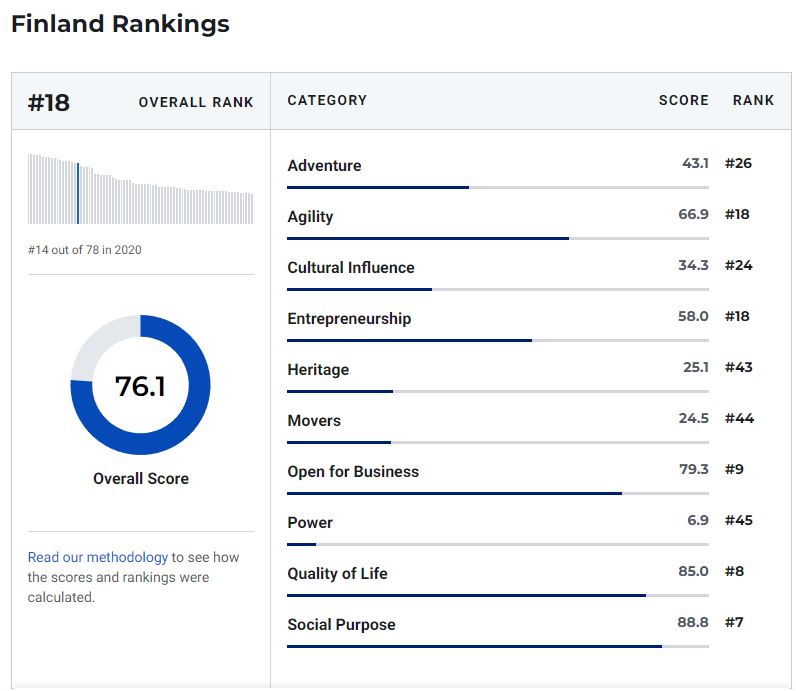

OVERVIEW OF GERMANY (sources US News)
Germany, the most populous nation in the European Union, possesses one of the largest economies in the world and has seen its role in the international community grow steadily since reunification. The Central European country borders nine nations, and its landscape varies, from the northern plains that reach to the North and Baltic seas to the Bavarian Alps in the south.
Germanic-speaking tribes in northern Europe date to antiquity, but the modern German state took shape in the 19th century. Defeats in the two world wars of the 20th century left the country divided, and reunification occurred in 1990 following the collapse of the East German communist state. Germany is a parliamentary democracy. The legacy of Nazism expresses itself today in the form of tough laws that address both hate speech and the denial of the Holocaust.
Germany employs a social market economy – open-market capitalism that also carries certain social service guarantees. Its economy is one of the world’s largest and Germany is one of the globe’s leading importers and exporters. Services, which include industries such as telecommunications, health care and tourism, contribute the greatest amount to the country’s economy. Industry and agriculture are other significant economic sectors.
Germany possesses a highly skilled, affluent workforce. The country’s population is aging, however, raising questions about the high level of spending for social services. The overwhelming majority of citizens are ethnic German, with Turks and other Europeans representing significant minority populations. Germany is one of the world’s most popular migration destinations, though its open-door policy has become a point of contention in the wake of crimes committed within the country's borders recently. Chancellor Angela Merkel faced challenges to her power following her party’s mediocre showing in the September 2017 national elections, a development that reverberated across the European Union.
Culturally, Germany has produced some of the world’s leading figures in the natural and social sciences, as well as the arts. The land that gave birth to the modern printing press, Ludwig van Beethoven and Immanuel Kant has strong traditions in literature, music and philosophy. Folk festivals remain popular in modern-day Germany, the most notable being the annual Oktoberfest.
Germany belongs to major international organizations, including the United Nations, the European Union, Group of 20, NATO and the Organization for Economic Cooperation and Development.
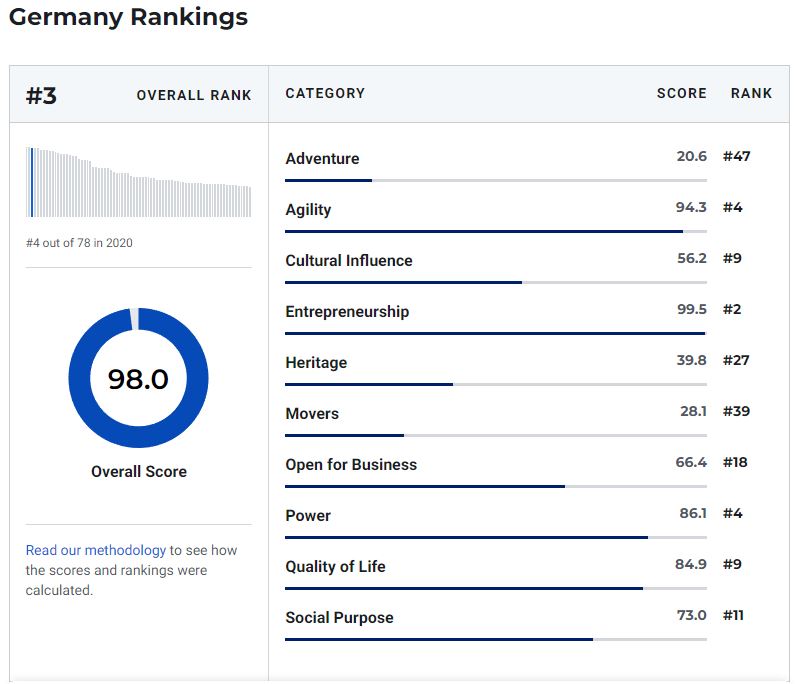

OVERVIEW OF NEW ZEALAND (sources US News)
British and Polynesian influences course through picturesque New Zealand, an island nation in the Pacific Ocean southeast of Australia. Early Maori settlers ceded sovereignty to British invaders with the Treaty of Waitangi in 1840, and European settlers flooded in.
Today, 70 percent of Kiwis, a common term for the people of New Zealand after a native flightless bird, are of European descent. A sense of pride has surged among the Maori, the country’s first settlers who now account for about 14 percent, as homeland grievances become more openly addressed.
Though the British monarch remains head of state, New Zealand has operated under an independent parliamentary democracy led by a prime minister since its independence in 1907. In 2017, Prime Minister Jacinda Ardern led the progressive Labour party to victory and became the youngest female leader in the world.
The majority of New Zealand's population is concentrated in the north island, with nearly one-third living in Auckland alone. But low density and scattered populations make for peaceful exploration of the nation’s impressive mountains and pristine beaches of “Lord of the Rings” trilogy movie fame.
New Zealand saw impressive growth and transformation in the decades following independence. The export market, abounding with dairy, sheep, beef, poultry, fruit, vegetables and wine, was opened beyond the U.K., and manufacturing and tourism were expanded. Per capita income remains high and education expenditures as a percent of gross domestic product are some of the highest in the world.
The Kiwi spirit and culture are personified by such notable natives as Sir Edmund Hillary who first climbed Mount Everest in 1953 and Lord Rutherford, who split the atom. The bungee jump, Hamilton Jet boat, referee’s whistle and frozen meat are also credited to New Zealanders.
Since 1980, New Zealand has been a nuclear free zone. It is a leader in peacekeeping and global security and party to key international organizations, including the United Nations, the Organization for Economic Cooperation and Development, the Asia-Pacific Economic Cooperation and Pacific Islands Forum.
